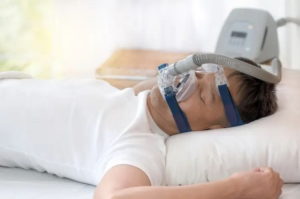Waking up gasping for breath is a frightening experience. If it occurs frequently, it can damage the quality of your sleep. Don’t ignore this if it happens to you or someone you know, such as your spouse or a family member. It can be a sign of a more severe health issue.
Waking Up Gasping for Breath – What Causes It?
There are many possible reasons why you wake up gasping for air. You should find out the cause to address it properly and avoid further complications. The best way to address the problem is to see a sleep doctor or specialist. They are the professionals who have the right expertise to evaluate your symptoms and make the correct diagnosis.
Below are some of the possible causes for waking up gasping for breath.
Sleep Apnea
Obstructive sleep apnea (OSA) is a serious sleep-related problem. This breathing disorder causes a partial or total pause in your breathing during sleep. Obstructive sleep apnea happens when the airways collapse and obstruct your breathing pattern. Therefore, it is accompanied by other symptoms such as loud snoring and waking up choking or short of breath. There are also other symptoms of obstructive sleep apnea, such as morning headaches and feeling tired when you wake up.f
Approximately 12% of adults in the US are diagnosed with obstructive sleep apnea. However, experts suspect it might be more than that since many cases are left undiagnosed. Using a CPAP machine is the most common treatment for sleep apnea. There are also other treatment approaches, including lifestyle factors such as weight loss (since the risk for OSA increases with obesity).
Aside from obstructive sleep apnea, there is another type of the same breathing disorder: central sleep apnea (CSA). CSA is a less common form of sleep apnea wherein the pause in breathing occurs due to a brain signal. There are various treatment options for CSA depending on the cause.
Both sleep-related breathing disorders are highly linked to waking up and gasping for breath. Make sure to seek treatment with an expert to avoid life-threatening complications.
Hypnic Jerks
Hypnic jerks are muscle twitches that happen involuntarily while you sleep. When you experience hypnic jerks, it is accompanied by a gasp. You could also feel your heart racing.
Sleep experts and doctors are not sure about the cause of hypnic jerks. However, they do have some theories. One theory is that hypnic jerks are a result of the nerves misfiring when your body transitions from the waking state into a sleeping state. Another expert theory is that your muscle twitches when you enter into the sleep state too quickly due to exhaustion.
Your body follows a natural process of the brain waves slowing down, the muscles relaxing, and the breathing and heartbeat decelerating as you prepare for sleep. When all of these things happen too fast and simultaneously, it could signal to your body that your health is in trouble. You are jolted into consciousness in the form of a muscle twitch.
When the muscle twitching happens involuntarily, it can cause you to wake up gasping for air.
Heart Failure
A congestive heart failure could be another reason you wake up gasping for air at night. When you have heart failure, your heart cannot pump blood, resulting in a fluid build-up on your lungs and other body parts. The excess fluid makes it difficult to breathe, especially when you are lying down.
The fluid build-up could also be why you are gasping for air when you sleep, causing you to snap out of sleep. You could also experience other symptoms, such as shortness of breath, coughing, and fatigue. This chronic condition could be treated with surgery, medication, and lifestyle management.
Nocturnal Asthma
When you have asthma, your airways are inflamed. Inflamed airways make breathing difficult because the air passage tightens. Patients diagnosed with asthma are more likely to wake up gasping for air or choking during sleep. It is called nocturnal asthma because there is more airway resistance during the night or when sleeping, which makes breathing more difficult. As a result, you can also experience shortness of breath.
You must talk to your doctor about your asthma condition and how it affects your sleep.
Acid Reflux
Acid reflux occurs when stomach acid flows back into the esophagus. Gastroesophageal reflux disease (GERD) is a more severe case of acid reflux, and it affects one in five adults.
If you are diagnosed with this condition, you will experience frequent awakenings during the night and could find yourself gasping for air. It is also accompanied by symptoms like choking, heartburn, and regurgitation. It is a complex condition to diagnose and treat because GERD causes sleep deprivation, while GERD symptoms can worsen with lack of quality sleep.
Postnasal Drip
If you have a cold, allergy, or any condition that comes with a runny nose, you will notice that you are more prone to waking up gasping for breath. When you have this condition, there is a tendency for extra mucus to accumulate in the back of your throat.
This cause for waking up gasping for air is nothing serious. In fact, it is pretty common. But it does not take away from the fact that it can be irritating when it disrupts your sleep. To avoid this problem, doctors recommend sleeping with your head propped up a little to allow the mucus to drain instead of accumulating in the back of the throat. You should also avoid sleeping flat on your back.
When to See a Doctor
Do you find yourself waking up gasping for breath? You need to consult with a doctor immediately if other symptoms accompany it.
Only a sleep doctor or specialist can evaluate your symptoms and determine if you have more severe health concerns. Seeking professional help will also get you the treatment you need to prevent more serious complications that could risk your life (or that of someone you know).


























